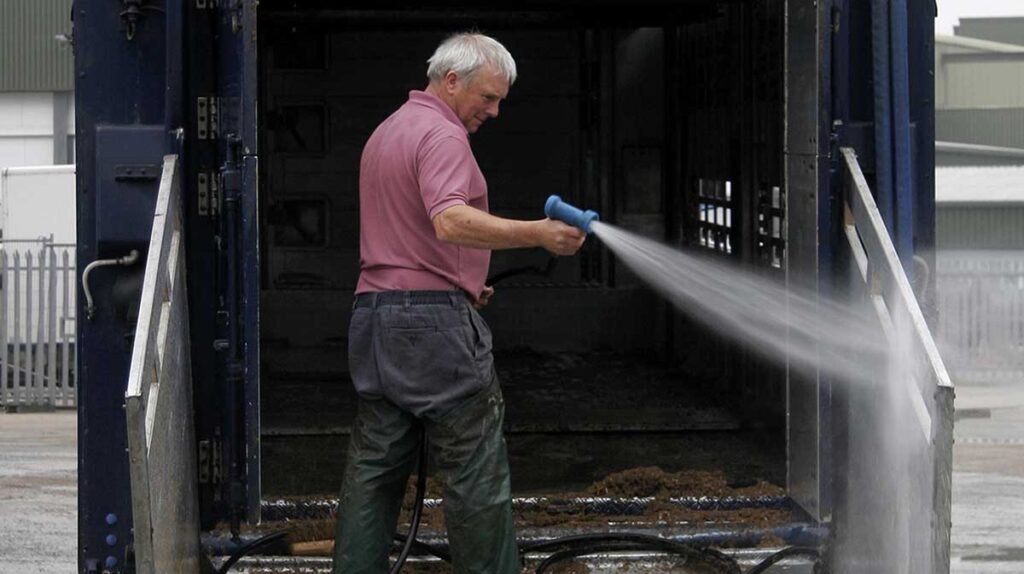Those of you who receive notifications from the AHDB Significant Diseases Charter may be aware of the increased prevalence of swine dysentery in the UK.
Infections in your herd can have significant effects on the health and welfare of pigs, but also high economic impacts, with costs of up to £10 per animal.
These increased costs are associated with decreased growth rates, higher feed costs, medication and veterinary treatment, and high mortality rates. But what exactly is swine dysentery? How can we minimise the risks to our herds? And, ultimately, how can we keep it out of our units?
Symptoms and signs of infection
Swine dysentery is a bacterial infection caused by Brachyspira hyodysenteriae. Once an animal becomes infected, it causes severe damage to the colon, resulting in acute inflammation and profuse watery diarrhoea, streaked with fresh blood and mucus.
Initially, the disease spreads quite slowly, as the incubation period (time from exposure to the bacteria to the development of symptoms) is normally seven to 14 days, but this can vary, and it can be as long as 60 days.
The first signs of infection include pigs becoming lethargic, a reluctance to eat and diarrhoea. As the level of this bacteria in the environment rises, you can expect to see increasing cases of scour, loss of body condition, fever (temperature of 41°C), and high herd mortality.
Spread
Swine dysentery spreads via the faecal-oral route – this means that the bacteria reside within the gut of an infected pig. It is then excreted in their faeces and is subsequently spread to other pigs within the environment.
Infected pigs continue to shed the bacteria for 10-12 weeks. The disease may also spread to other animals that encounter the contaminated faeces.
Other species that are susceptible include rodents, birds, cats and dogs. However, the primary method of spread is through fomites, which are inanimate objects or living carriers of the infected faeces/material – such as boots, clothes, vehicles and, most importantly, people.
Treatment
Treatment options are quite limited. Antibiotics administered for seven days are generally effective in clearing up the infection. However, the bacteria are robust and can survive in cold and wet environments for up to eight weeks. This means that treated pigs often become reinfected.
Therefore, a partial or complete depopulation with extended antibiotics treatment, a strict cleaning and disinfection regime and allowing buildings to fully dry after cleaning is the gold standard method of eradicating the disease.
Prevention
So, how do we prevent this bacterium from becoming rife in our units?
High-quality vermin control is paramount with all-in, all-out pig flow, which enables strict cleaning and disinfection of the unit to take place.
Other key preventative methods are minimising the entry of people and vehicles on-site, and ensuring that visitors use designated boots and overalls to prevent cross-contamination from other sites.
Keeping good records, such as a visitor book, can be an effective way of monitoring human movement and machinery disinfection.
A major risk factor is cross-contamination from abattoir lorries. It is, therefore, highly advisable that lorries entering your site to collect your pigs are thoroughly cleaned and disinfected, and that this has been documented for future reference.
As aforementioned, swine dysentery has a profound effect on the health and welfare of your animals, but may also have devastating economic effects.
It is imperative that all staff and visitors actively work towards preventing the development of this disease, and that measures are enforced to minimise the spread, in the case of an outbreak.
All farmers need to remain vigilant and ensure that any visitors to their units – for example, veterinarians, engineers and feed companies – have been thorough in their cleaning and disinfection protocols.
All of the above efforts will aid in preventing the catastrophic effects of swine dysentery.




